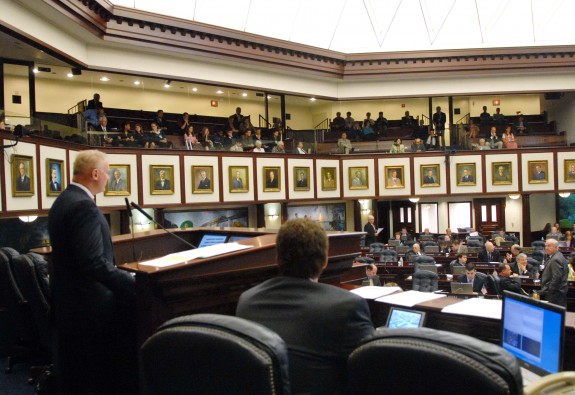
The Florida Legislature approved a ballot measure this week for 2014 that will allow the winner of this year’s gubernatorial election stack the Florida Supreme Court. (Photo via MyFloridahouse.gov)
By Ashley Lopez
Florida Center for Investigative Reporting
This week, the Florida House of Representatives signed-off on a proposed constitutional amendment that would allow the next governor to appoint three justices for the Florida Supreme Court. The measure now heads to voters for approval on the 2014 ballot.
If passed with 60 percent of the vote, the measure would allow the next governor to make appointments to the Florida Supreme Court even if the seats are vacated on inauguration day, which is the likely scenario several years from now.
That’s because three justices currently on the Florida Supreme Court will have to retire on the same day the governor’s term ends, Jan. 8, 2019. Justices are required under Florida law to retire at age 70, but they can continue to serve until the end of their six-year term.
This means the more liberal members of the Florida Supreme Court –Justices R. Fred Lewis, Barbara Pariente and Peggy Quince —will likely be retiring at the same time. All three will turn 70 at some time during the next governor’s term, and their six-year terms will all end on the same day as the new governor is sworn in.
Proponents of this proposed ballot measure argue that the law is too vague on who will be tasked with appointing those vacated seats, which could lead to a “constitutional crisis.” They say the law doesn’t specify whether the incoming or outgoing governor should pick the justices.
This week, however, the Florida Legislature sent a proposal to clarify that for voters.
Florida legislators took the final step to put an amendment on the November ballot Wednesday that asks voters to decide whether to give Florida’s governor new powers to make prospective appointments to the state Supreme Court.
The proposed constitutional amendment, SJR 1188, was approved by a 74-45 partisan vote in the Florida House following its Senate passage. The amendment will be the third one on the ballot and must be approved by at least 60 percent of voters on Election Day to become law.
…The proposal, initiated by Sen. Tom Lee, R-Brandon, is necessary to avoid “workload interruptions” after the justices retire, said Rep. Larry Metz, R-Yalaha. The law requires that the Judicial Nominations Commission has up to 60 days to recommend three candidates for each of the vacancies that occur when the justices retire and then gives the governor 60 days to make a choice.
“We don’t want to have gaps in service,’’ Metz explained.
Democrats suggested that the current system is working fine and is unlikely to result in a constitutional crisis that Republicans warned about.
“Once you know there is agoing to be a vacancy by all means start that judicial nominating process but the person that makes the selection should be the governor who is the governor for that coming term,” said Rep. Jim Waldman, R-Coconut Creek.
This isn’t the first time state legislators have angled to have a say in how Florida Supreme Court justices are appointed.
In 2012– among a slew of Legislature-pushed ballot amendments—lawmakers unsuccessfully tried to amend the state constitution to require that the state Senate sign off on justice appointments, which experts said would have politicized the state’s highest court. That ballot measure would have also allowed the Legislature to repeal any court decision with only a majority, which is 50 percent plus one. Right now, the legislature needs a supermajority, a vote count that is much harder to achieve.
The state Republican Party also led an effort in 2012 to oust Lewis, Pariente, and Quince, who were all appointed by a Democratic governor. The party, backed by right-wing groups funded by the conservative Koch brothers, tried to get the three justices voted out during their merit retention votes. Like the ballot measure, though, that merit retention fight failed.
